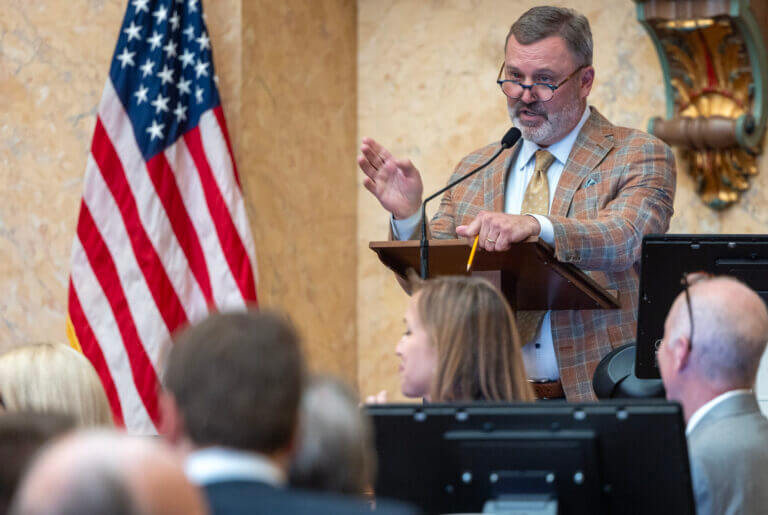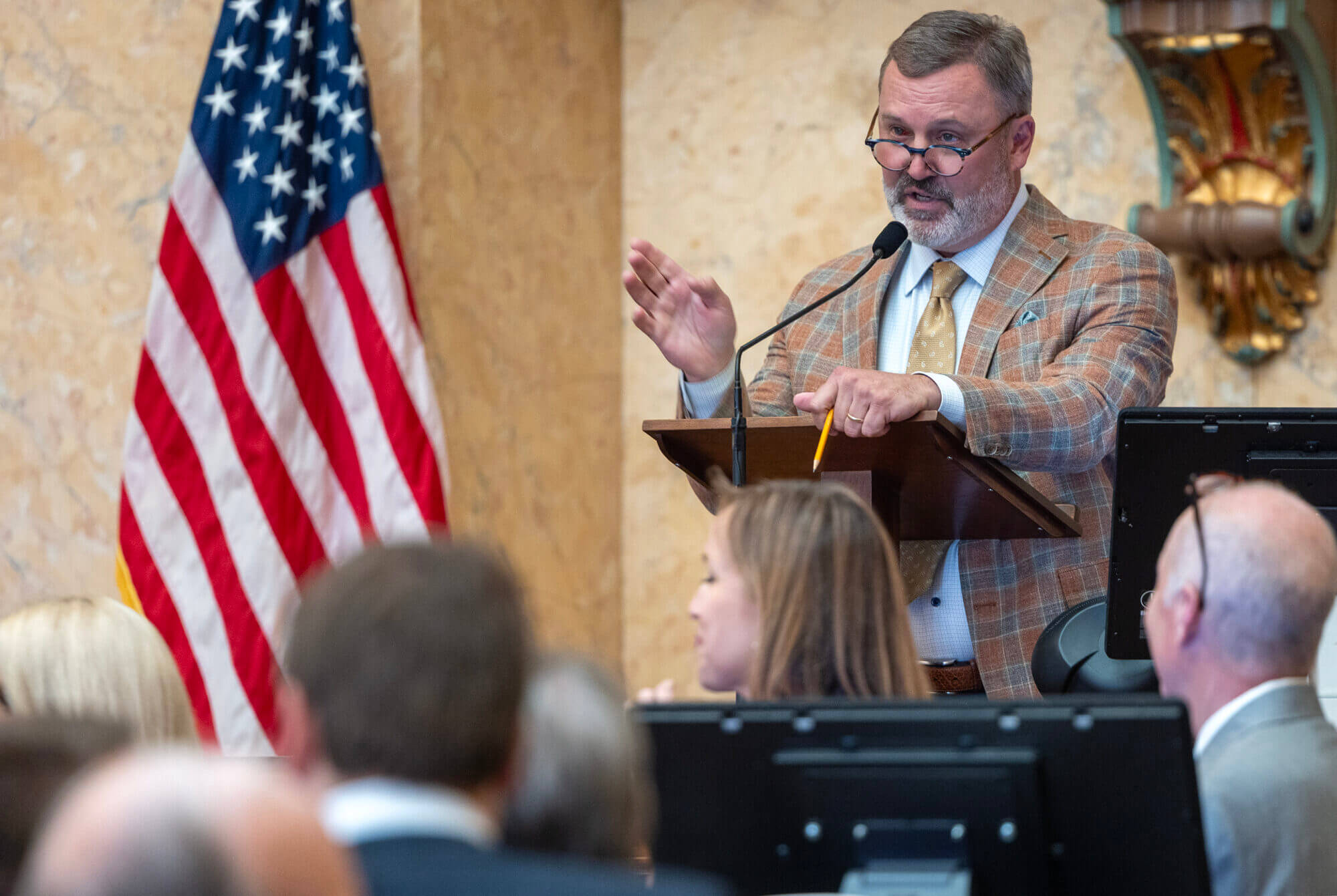

Senate leaders on Thursday realized improper spending of $1.9 million in the Health Department’s budget bill sent over by the House could jeopardize $1.2 billion in federal Medicaid money for Mississippi.
But after it passed the measure Wednesday night — despite having been warned about the problem — the House went home. It declared its work for a special session to set a state budget done, and the Senate could either concur, or … lump it.
It left the Senate holding the bag.
The Senate was left with some onerous choices: Pass a bill with a known disastrous flaw and hope the governor can fix it with a line-item veto, stay in Jackson with senators twiddling their thumbs at taxpayer expense until the House is by law forced to return in three days, or kill the bill. This would leave the Health Department without a state budget as the new budget year looms on July 1, and the governor would have to force lawmakers back into yet another special session to fix it, at taxpayer cost.
After hours of debating what to do and talking with the governor’s office, the Senate opted for the former option — it sent the flawed bill to Reeves after securing his promise that he would veto the element of the legislation that jeopardized Medicaid funding.
“I think today, if we were in the grocery store business, we’d be hearing over the intercom system, ‘cleanup on aisle five, cleanup on aisle seven, cleanup on aisle 14.’ It’s been a mess. We’ve been doing a lot of cleanup today,” said Senate Medicaid Chairman Kevin Blackwell, a Republican from Southhaven. “The governor has assured us he will line-item veto this bill … I’m going to trust him, he’s never lied to me.”
The move allowed senators to pass the state budget and conclude the special legislative session, but only after senators on Thursday plodded through the passage of numerous bills the House had sent over after it pulled an all-nighter and left town. They complained the House had sent numerous jacked-up bills over and then skedaddled, leaving little recourse to fix problems.
In this case, the problem was the House’s Health Department budget proposal, which allocated $1.9 million to Methodist Rehabilitation Center. This would make the center whole after paying more in provider taxes than it is receiving in directed payments from Medicaid.
But the Centers for Medicare and Medicaid Services deems this improper and says certain entities cannot be exempted in such a way. Provider taxes must be imposed uniformly to meet federal law and CMS regulatory standards. This means the tax must be applied across the board as it relates to similar providers of that type.
To meet these requirements, states attest they will not refund certain providers and, in essence, hold them harmless from the tax. Providing a special appropriation to reimburse one hospital for the tax they pay appears to violate these requirements, which could jeopardize the provider tax for all hospitals in Mississippi.
Provider taxes, which are helping prop up hospitals in Mississippi without Medicaid expansion, are under extreme scrutiny in Congress right now because of issues like this.
The bill originated in Republican Rep. Clay Deweese’s budget subcommittee. Deweese could not be reached for comment on Thursday.
House Public Health Chairman Sam Creekmore, R-New Albany, said he found out about the issue after the bill passed out of committee in the House on Wednesday, before it came before the full House for a vote.
“We were so late in the game when we discovered it, it had already passed through appropriations,” Creekmore said. “It was in Clay’s committee, of course I had some influence over that, but it was Clay’s call to let it ride.”
Neither House Speaker Jason White nor Gov. Tate Reeves on Thursday immediately responded to requests for comment.
Senate leaders on Thursday said they were in communication with the governor’s office and he had assured them he would line-item veto the House’s SNAFU.
In a social media post on Thursday afternoon, Reeves did not mention the health budget error, but he acknowledged he had meetings with Lt. Gov. Delbert Hosemann throughout the day about “concerning” items in some bills. He urged senators to knowingly pass the bills with errors so he could issue a veto and end the special session on Thursday.
“We have identified a few minor items that are concerning in a few — of the over 100 — bills that must be passed,” Reeves said. “I believe it is important that the Senate pass these bills as is to get the Session completed … and I will use my constitutional authority to deal with the concerning items to protect Mississippi citizens, businesses, and taxpayers. The best thing for taxpayers is no doubt for the Special Session to be wrapped up today, and I appreciate everyone working with us to get that accomplished.”
Some senators lamented that setting a budget, controlling the state’s purse strings, is the domain of the Legislature, not the executive branch, and they bristled at the idea of Reeves having to fix problems through vetoes because the House left and refused further parlay.
The saga marked the second instance in recent months where a consequential error evaded the notice of lawmakers and threw a wrench in the legislative process.
During this year’s regular legislative session, the Senate accidentally passed a typo-riddled bill to eliminate the state income tax. Instead of a long, cautious phase-out of the income tax, the Senate accidentally approved a phase-out that would happen at a much faster clip, as the House had wanted. The House leadership realized the Senate’s error and ran with it. Reeves later signed the typo tax bill into law.
More broadly, rank-and-file lawmakers in recent years, both Democrat and Republican, have complained they aren’t provided budget details or drafts of major bills in time to vet and debate them. Senators on Thursday said there were numerous other bills sent from the House with errors or changes that had not been agreed to by both chambers.
“We need to remember that this is the same legislative session where we inadvertently, or advertently, sent over legislation with a typo in it, figured out there was a typo in the legislation, and it was still sent to the governor and signed as is,” said Sen. Rod Hickman, a Democrat from Macon. “And now we’re saying we’re going to trust this same process to fix an error that we all know about, and we’re all on the record knowing about, that could jeopardize this entire (Medicaid) program.”
- Generators, blankets, candles: Mississippians without power cope in the cold - January 27, 2026
- Legislator’s bill aims to close six-week payday gap for Mississippi public school teachers - January 27, 2026
- Sen. Hillman Frazier: Mississippi must act now on child care for working families - January 27, 2026